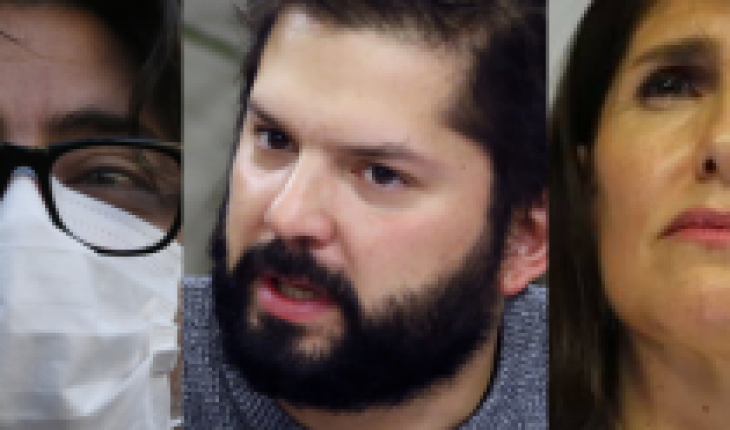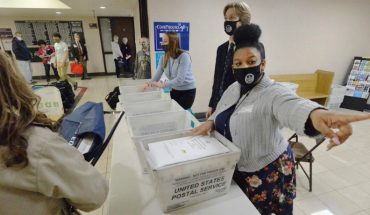
Registrations of nominations and pacts before the Electoral Service (Servel) have always had their share of drama, tension, friction, cocks and conflicts, but a show as embarrassing as yesterday starred in the various oppositions, prior to the registration of the pacts for the July legal primary. Changes in political domicile, frantic negotiations and failed last-minute agreements were the balance of a political melodrama on which there are too many versions and many cross-recriminations.
Between 6 p.m. and 7 p.m., everything was believed to be settled. It was in that period that the PS helmsman, Alvaro Elizalde, told his DC peer, Carmen Frei, “there is no turning back”, to notify him – while the phalanx was still on his National Board thinking of proclaiming Senator Yasna Provoste, after Ximena Rincón stepped aside – that the Socialists were changing their political address and would register in the legal primary. Words that not only ended two days of negotiations of all kinds, but also put the tombstone to the privileged political relationship between Socialists and Christian Democrats for more than 30 years, a fact that radically changed the political landscape by placing the political axis and hegemony of the opposition on the left.
It was announced that there was a time set at the Servel to register the new pact at 8:30 p.m., while the DC National Board was stunned and assumed its adverse and solitary scenery ahead, as, during the day, the other flag bearers of the centre-left – Pablo Vidal (New Deal) and Heraldo Muñoz (PPD) – had come down in favor of the socialist flag bearer , Paula Narváez, so that the Pact Constituent Unity was virtually unensized, except for the DC and the Radical Party.
The “gesture” of the PPD and Heraldo Muñoz – and this is key to the development of the plot later – was based on the PS’s commitment to safeguarding the “understanding” that both forces have had in negotiating parliamentary staff, now that the Socialists would join the pact with the PC and the FA and that the PPD was aligned after Narváez for the primaries. It was also said that the “herald’s descent” was a way around the veto that was already on the left for that community and the DC to participate in the primary pact.
The talks were supposedly on track, even the document sealing the new PC, FA and PS political pact had already been drafted and the vetoes were said to be clearing, that the parliamentary issue was accepted without explicitly ching it to complicate the signing of the agreement.
But this new left-wing axis lasted only two hours. Before the deadline for the servel appointment, an avalanche of rumors began that the agreement had fallen, that there were cross-vetoes that could not be circumvented, that everything was at risk. The DC, meanwhile, was still on its National Board and it was around 9pm that Carmen Frei explained to her party that they were calling from PS. Ten minutes later, the interim helmsman informed the board that Elizalde had communicated again to tell her that the agreement with the PC-FA had fallen, that the primary of the then-phenicide Constituent Unit had been reactivated , but that she had told him that “at 9 a.m. we can’t change our decisions, you’ll excuse me for making that decision alone, but that’s the right thing to do.”
At this point, all sorts of guilty and eventually responsible versions were circulating from the parties, there was talk of an explicit veto from the Broad Front and the PC that the agreement was also signed by the PPD, which supported the socialist flag bearer, while Narváez hit the table and went live and went out to target the communists and the FA to “fake this opportunity” , if you do not give guarantees and do not honor the word pawned.
Around 11:30 p.m., the PC’s candidate Daniel Jadue and his broad front pair, Gabriel Boric, arrived at Servel, where their party leaders were waiting to formalize the registration of their legal primaries amid public and private recriminations for whom he was responsible for the failure of strategic understanding with the Socialists. At the exit of the firm, Jadue said that “there has been no veto of us here. The veto came from them (…), they wanted to be here because they f”and they came to ask for parliamentary quotas with the calculator, he accused.
Soon after, Elizalde arrived at the Servel and stiffly smeared those who were her partners for two hours: “Today when they have called for unity every day, they inform us that there is a veto of some forces supporting Narváez’s candidacy (…). We feel deceived, the Salvador Allende party is not humiliated like that.”
Three versions
As always in the most complex political episodes and in the most blundering mistakes, there is never a single version and last night’s TV series is no exception. From the PS they said that the PC and the Broad Front were always informed that they would not abandon the PPD on the parliamentary issue, that Elizalde and its Secretary General, Andrés Santander, came to THE RD headquarters to sign the agreement, but that they kept them waiting and, as was a long time without any sign from their new partners, they understood that there were problems , which had backed down and returned to the PS.
According to the FA version, the PS wanted to add a fourth point to the draft agreement, which was the parliamentary issue, that Social Convergence began internal consultations on the matter and that this delay the Socialist Party took it as a failure of the talks. They added that Elizalde also asked for the pact to be signed by the PPD, the Liberal Party and New Deal and that was when the problems began.
A third version suggests that the PC never wanted “the Concertation” within the pact, that they only wanted to add to the Socialist Party, which could have been paved if the PS had not been so inflexible on the parliamentary issue, as it insisted on packing it into the primary pact. The same sources claim that Elizalde was never so convinced of the new political domicile, that he did so only because of the pressure of the bases and parliamentarians of the collective, and that from Social Convergence they took the calculation and feared that Boric, if the broad pact were sealed, would be third in the primaries.
They say that the internal climate in the FA was resentful, that recriminations from RD to Social Convergence were harsh, strong, that they sent messages to the PS apologising, but they could also not jeopardize their coalition’s internal understanding and lost the battle.
Nothing will be like before
At the end of the night, neither the PS nor the DC nor the PPD enrolled for the legal primaries. While Carmen Frei said no to Elizalde – which earned her hosts the applause for being respected at the weakest and loneliest time in the phalanx – the bridges are not entirely cut off. Now, without the pressure of servel deadlines, the necessary political reflections can be made, decisions can be made calmly, and even the option of a conventional primary appeared on the horizon again. But the truth is that nothing will be like before, except between dc and PS.
In the PS they claimed yesterday afternoon that turning to the Broad Front and the PC was what socialism had to do, that there was no alternative, because with Sunday night’s results, the Primary Constituent Unit “got rid of DC’s failure in the constituent, there was no viability for that primary.” They added that the privileged alliance with Christian Democracy had entered crisis a long time ago and that Fuad Chahin’s management as helmsman “was a relevant factor in dynamiting the relationship” with the phalanx.
Although the attempt at the PS’s political change of address was thwarted, it is undeniable that policy-level understanding with the DC is not the best and that, by now, that alliance has looked more like a poorly accrued marriage, which is alongside a mixture of custom and convenience, but where long ago trusts and “political affection” had been scented. The best test of wear and tear is the difficulties that there were in the center left to be ordered in these three years in its opposition role.
In this regard, political analyst Carlos Correa recalled that the DC’s thesis on its own path, which promoted Chahin’s directive, agreed and negotiated tax reform with the Government of Piñera and that there a confidence was broken that never recovered: “Chahin’s hinged party thesis caused that break.”
The analyst and director of Tú Influyes, Axel Callís, agreed on that point and stated that the PS’s alliance with the phalanx “begins to break when DC decides to play for its identity in 2017. That’s the first break, with Carolina Goic’s candidacy, and when the DC didn’t find that identity, it was lost.” To that he added, he said, that these years the PS has not had a clear political line under Elizalde’s conduct: “These three years mark her death sentence.”
Before the new PS electoral pact with the Broad Front and the PC were dropped, the academicor analyst Marco Moreno was already warning that this was a hasty decision, that parties, and the Socialist Party in particular, “are not reading well the other elements of Sunday’s results,” that “it takes more coldness to make decisions” and that they were being left out variables like the broad electoral universe of those who did not vote this weekend and that it is always easier to win an election than then rule.
That said, Moreno also agreed that this strategic alliance between the Socialist Party and Christian Democracy was damaged, that the fracture – in his opinion – began “in Michelle Bachelet’s second government, he became more agued by the role of people such as Minister (Jorge) Burgos or (Ignacio) Walker since the presidency of the DC”. In any case, he made a point, that the center left in general, not just the phalanx, made the mistake in all these years of engaging in government, “they stopped representing the interests of the voters, that took them away from the bases, there was excessive governmentalization that was fatal.”
From the world of D.C., former community secretary general and political analyst Victor Maldonado acknowledged the exhaustion of that privileged understanding with socialism, in part because both forces lost their specific political weight. It noted that, while the milestone that actually marks the total decline was 2017, when the center left was unable to reach an agreement and the DC ran alone until the first presidential round with Goic, in both communities the leadership “did not give the width” and short-term looks were privileged.





